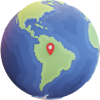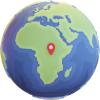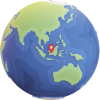Case studies are organised by region, with each region featuring links to the countries where the case studies are located.
Côte d'Ivoire

Côte d’Ivoire, the world’s top cocoa producer, is experiencing devastating deforestation driven by its principal economic activity, cocoa farming. Farmers typically rely on the natural soil fertility of virgin forests for high cocoa yields, leading to forests being cleared for cocoa cultivation. After five to ten years, when soil fertility dwindles, farmers move to the next fresh two to three acres of virgin forest to plant a new crop. This practice has led to a fourfold increase in deforestation in Saamaka lands and the growth of towns and villages in protected forest areas. To diversify and increase their income, some farmers make profitable deals with logging companies and illegal timber traders to remove trees to make way for cocoa crops. This practice has proved more lucrative for farmers than cocoa bean production, making illegal logging arguably one of the country’s most prevalent and lucrative forms of organised crime.
Keywords: Sub-Saharan Africa, Cote d’Ivoire, cocoa, primary production, deforestation, illegal timber trade, illegal logging, organised crime
Source: https://issafrica.org/iss-today/shady-cocoa-farming-at-the-root-of-cote-divoires-deforestation

According to Reuters, in May 2024, the Ivory Coast's Coffee and Cocoa Council (CCC) suspended around 40 cooperatives. These cooperatives were accused of hoarding cocoa beans with the intention of selling them at inflated prices, amidst a national supply shortage caused by adverse weather conditions and the spread of cocoa diseases. It is reported that these cooperatives and some independent buyers had stockpiled over 60,000 metric tons of cocoa since the mid-crop season began. This practice, though not illegal in itself, became problematic when it was used to drive up prices unfairly. While the official farmgate price was set at 1,500 CFA francs ($2.50) per kilogram, some cooperatives were demanding between 1,600 and 1,800 CFA francs at the ports of Abidjan and San Pedro. In response to these practices, the CCC suspended the trading activities of the implicated cooperatives and buyers, in order to stabilise the domestic market and prevent smaller exporters from being outcompeted by larger multinational companies willing to pay higher prices. While the CCC’s actions were largely supported by exporters, Reuters reports that the situation revealed underlying tensions within the cocoa supply chain.
Keywords: Sub-Saharan Africa, Côte d'Ivoire, cocoa
Sources: https://www.reuters.com/world/africa/ivory-coasts-cocoa-regulator-suspends-cooperatives-hoarding-beans-sources-say-2024-05-17/

The Institute of Security Studies reports that extremist groups are involved in illegal artisanal gold mining in Côte d'Ivoire. Gold mining activities are concentrated in areas like Bagoué, Bounkani, and Tchologo in the north of the country, as well as in protected areas like the Comoé National Park. Extremist groups typically use intermediaries to interact with local miners, using subsequent earnings to finance their operations. They provide financial support and operational equipment to the miners in exchange for a share of the gold produced or at reduced prices. The presence of extremists has created a climate of fear among local miners, with many miners experiencing encounters with armed groups who demand gold. This presence has led to a decrease in mining activities, as miners are afraid to operate in areas controlled by extremists. The report also gives the example where a miner from Burkina Faso described how he was approached by jihadists who offered financial support and a secure market for his gold. The miner eventually fled to Côte d'Ivoire due to the risks involved. Overall, the extremist groups' involvement in gold mining has both economic and social repercussions, disrupting local economies and contributing to insecurity.
Keywords: Sub-Saharan Africa, Côte d'Ivoire, minerals, gold, primary production, illegal mining, conflict and terrorist financing
Sources:
https://issafrica.s3.amazonaws.com/site/uploads/war-44.pdf

Ivory Coast’s market regulator, under the leadership of Yves Brahima Kone, is planning to introduce measures to curb fraud related to fair-trade certified cocoa contracts. The Coffee and Cocoa Council (CCC) suspended sales of fair-trade certified contracts after recording an exponential increase in certified cocoa. Buyers and co-operatives have been using this program to push multinational companies into overpaying. To combat fraudulent contracts, the regulator is considering limiting the number of cocoa buyers to 30 from over a thousand. Next year, Ivory Coast will introduce a new certification and traceability system to align with European regulations on the import of commodities linked to deforestation.
Keywords: Sub-Saharan Africa, Côte d'Ivoire, cocoa, fairtrade fraud, deforestation
Source: Ivory Coast's regulator weighs options against fraudulent cocoa certification (timeslive.co.za)

The Verité report on coffee in Africa examines the challenges and issues within the coffee supply chain, focusing on labour rights and social responsibility. It highlights widespread issues such as child labour, forced labour, and poor working conditions among coffee workers across several African countries. These problems are exacerbated by factors like poverty, lack of education, and inadequate labour protections. The report identifies key areas for improvement, including enhancing transparency and accountability throughout the supply chain, strengthening labor laws and enforcement mechanisms, and promoting responsible sourcing practices among coffee buyers and exporters.
Verité calls for concerted efforts to address systemic issues in the coffee sector, ensuring that economic growth benefits all stakeholders fairly and sustainably.
Keywords: Sub-Saharan Africa, Côte d'Ivoire, coffee, primary production, labour rights violations, child labour, forced labour
Source: https://verite.org/africa/explore-by-commodity/coffee/


The Environmental Crimes Financial Toolkit is developed by WWF and Themis, with support from the Climate Solutions Partnership (CSP). The CSP is a philanthropic collaboration between HSBC, WRI and WWF, with a global network of local partners, aiming at scaling up innovative nature-based solutions, and supporting the transition of the energy sector to renewables in Asia, by combining our resources, knowledge, and insight.


